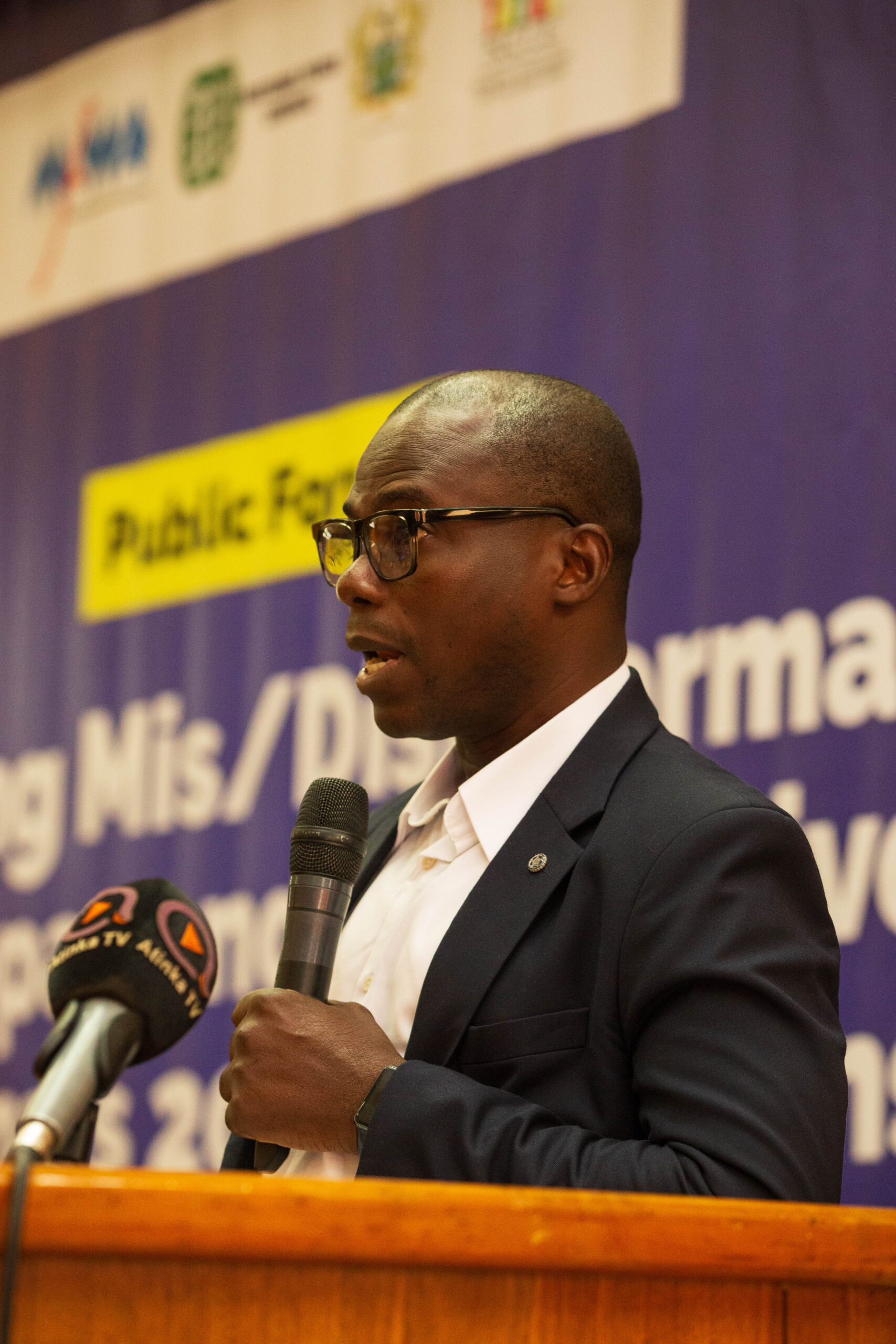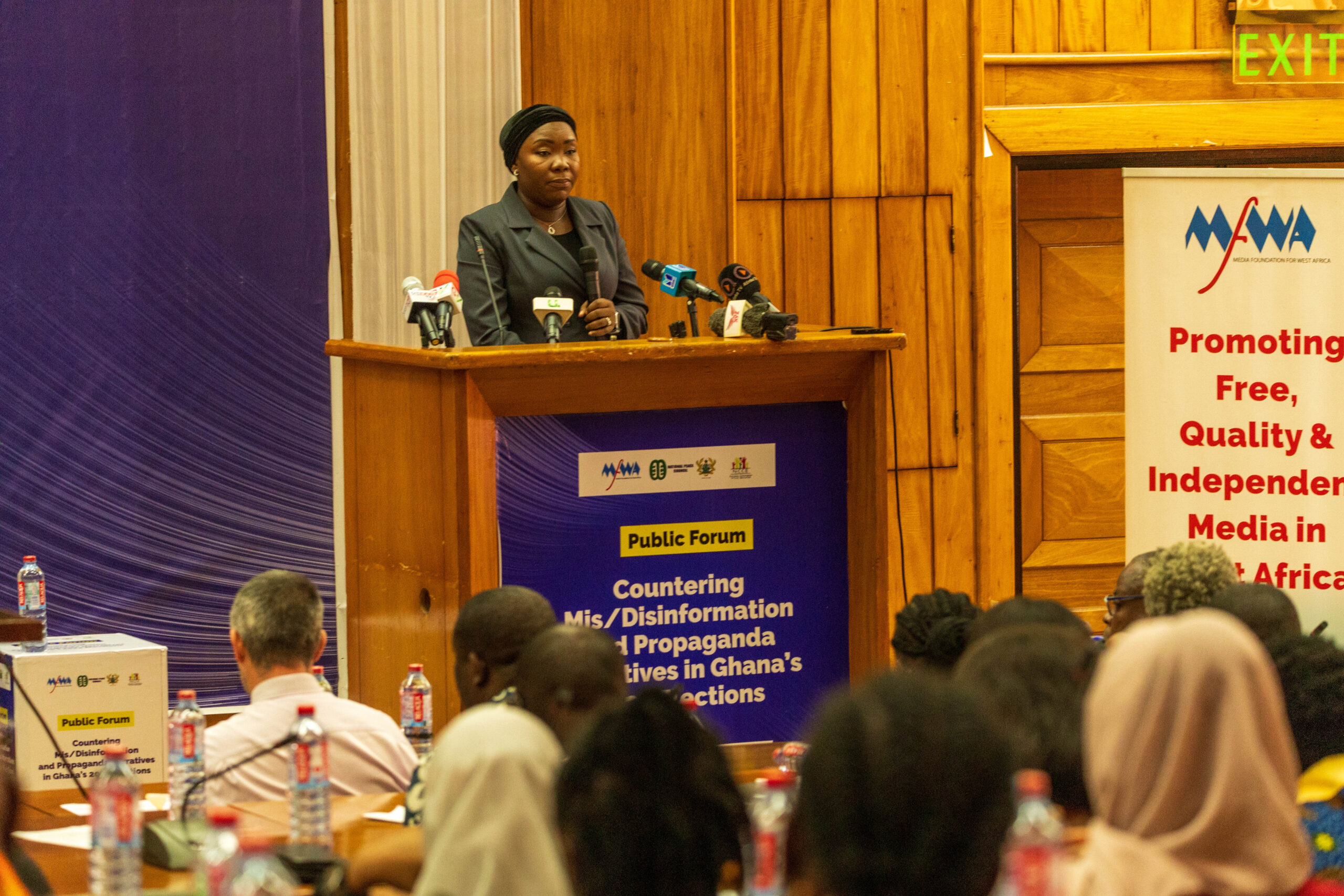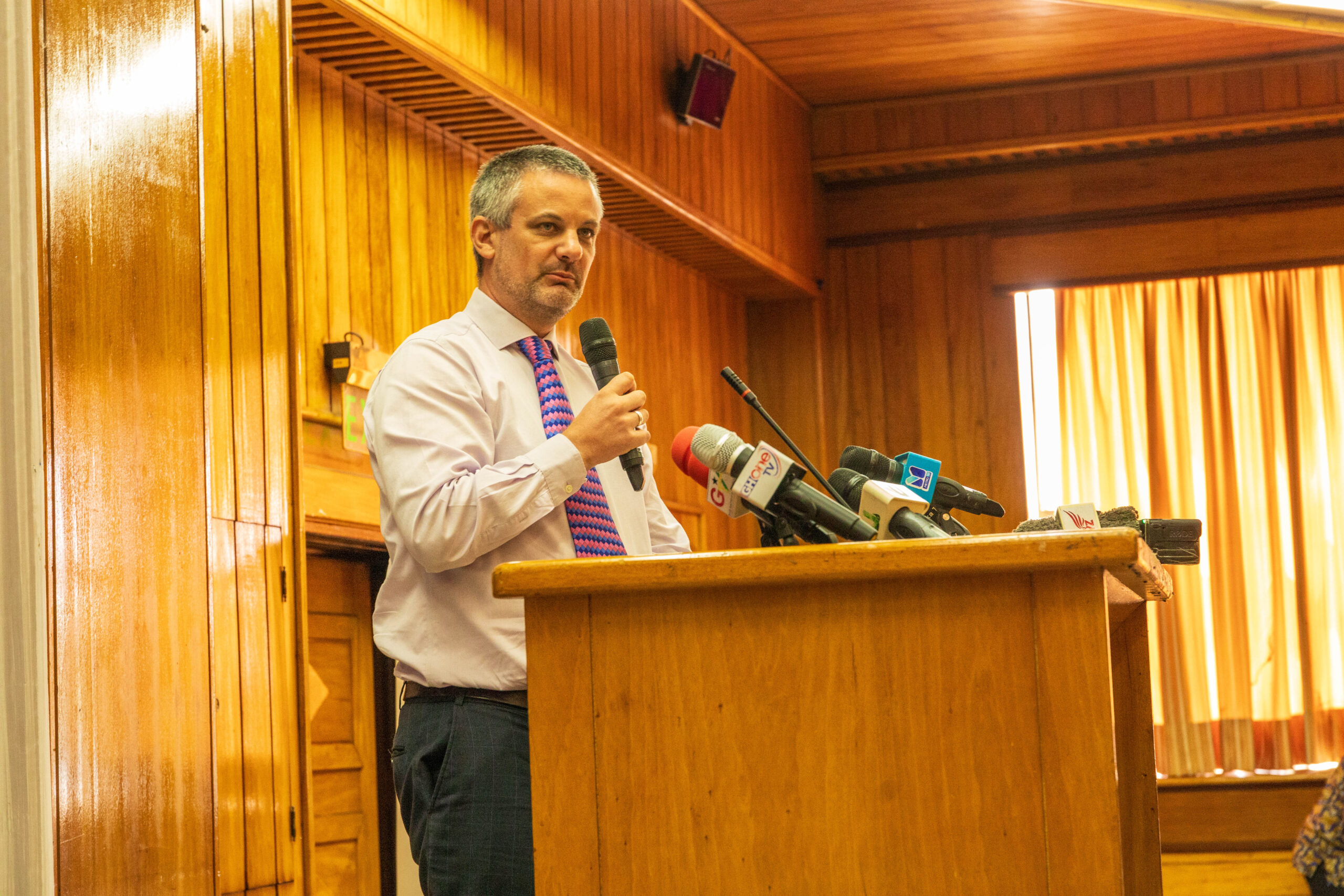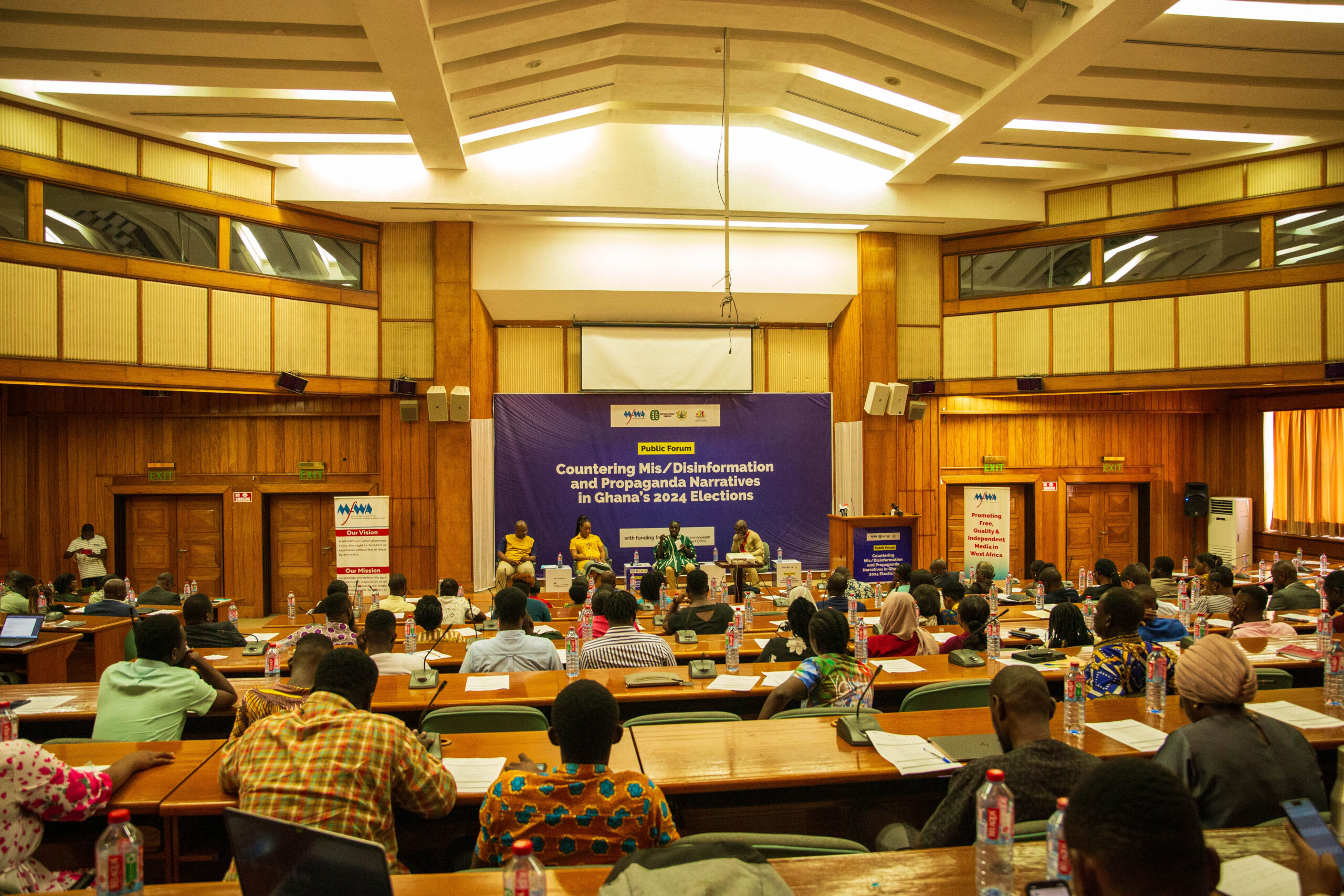A one-day forum on mis/disinformation and propaganda narratives in Ghana closed with a call on stakeholders to collaborate towards ensuring that the phenomena do not dominate the political campaigns before, during and after Ghana’s general elections in December 2024.
The media, civil society, government and media associations were urged to unite efforts towards ensuring that the elections are policed with fact-checking to ensure that they are issues-based.
The call is a summary of a number of recommendations that were made at the end of the one-day public forum which was held under the theme: Countering Mis/Disinformation and Propaganda Narratives in the 2024 Elections in Ghana.
The programme came off on Wednesday, March 27, 2024, at the Accra International Conference Center (AICC) and was organized as part of an eight-month project on mis/disinformation that the MFWA has been running since 2023, with funding from the Foreign Commonwealth and Development Office (FCDO) of the government of the United Kingdom.
Under it, 100 media practitioners, including 75 journalists and 25 social media influencers have been trained in fact-checking to enable them to detect, expose and counter mis/disinformation.
The forum brought together 150 stakeholders from government, media, national security, the diplomatic community, traditional and religious authorities, civil society and academia. It was chaired by Rev. Dr. Ernest Adu Gyamfi, Board Chairman of Ghana’s Peace Council, with Hon. Fatimatu Abubakar, Minister for Information Designate, as the Guest of Honor.
The forum provided a platform for an incisive dialogue that consisted of compelling presentations, a panel discussion and a brainstorming session to flesh out ideas to inform strategies.
Ghana faces serious challenges with election 2024

In a welcome address, the Executive Director of the Media Foundation for West Africa (MFWA), Sulemana Braimah, said it was imperative for participating stakeholders to critically dialogue and brainstorm for actionable solutions because, in the upcoming election in 2024, Ghana faces challenging times.

According to him, while the proliferation of mis/disinformation has become a global problem, the situation is getting increasingly alarming in Africa. He cited a recent publication by the Africa Centre for Strategic Studies which revealed that in 2023 alone, there were 189 documented disinformation campaigns in Africa.
The figure is said to be almost four times the recorded incidents in 2022. “I should add that these are documented cases. There certainly would have been several undocumented operations.
“What makes the situation more alarming for us in Ghana is that, West Africa has become the epicenter of disinformation campaigns,” Sulemana Braimah said.
According to the report by Africa Centre for Strategic Studies, in 2023, while there were 15 documented campaigns targeting North Africa; 33 in East Africa; 21 in Southern Africa; and 21 in Central Africa; there were as many as 72 campaigns that targeted 13 West African countries. The number for West Africa represents almost 40% of all the campaigns that targeted Africa.
Ghana under a scourge of mis/disinformation already

In an acceptance speech, the Chairman of the forum, Rev. Dr. Ernest Adu Gyamfi, underscored the timeliness of the forum saying it was important that the discussions are productive because Ghana is already facing a scourge of mis/disinformation.
“As Ghana gears up for its 2024 election, the need to tackle the spread of false information and manipulative narratives has never been more pressing.”
The impact of hate speech, he said, extends beyond the election period. It perpetuates a culture of division and animosity, making it increasingly difficult for different political factions to find common ground. This polarization hampers meaningful dialogue and obstructs the search for shared solutions to complex issues.
“When inflammatory rhetoric becomes commonplace, it desensitizes individuals to the impact of their words. Respectful and civil discourse is replaced with insults and personal attacks, degrading the quality of political discussions.”
Mis/disinformation should be fought collaboratively

On her part, the Hon. Minister Designate for Information, Fatimatu Abubakar, said the canker of mis/disinformation, as alarming as it is, should not evoke despair but provide stimulus for stakeholders to come together and fight it.
“As citizens and custodians of democracy, it is incumbent upon us to confront this challenge head-on. The integrity of our elections is not merely a matter of political expediency; it is a fundamental pillar upon which our democratic institutions rest. It is the bedrock upon which the voice of the people is heard and the will of the electorate expressed.”
She expressed lament that even though Ghana has multiple outlets in its media space, and under normal circumstances should have its citizens better informed, the space is replete with mis/disinformation and propaganda narratives.
Meanwhile, she said the government has, on its own, already been tackling the problem by means of a number of strategies, especially media literacy programmes.
Preparation is everything
Mr. Richard Sandall, Development Director at the British High Commission in Ghana, represented the British government, emphasised the absolute need for stakeholders to prepare for an onslaught of mis/disinformation in the country’s upcoming elections.

He applauded Ghana’s democratic growth, pointing out that the successful organization of eight elections in the Fourth Republic is something to be proud of, however, there are pressures that continue to mount on the country’s democracy.
“That’s why the UK is so happy to partner with the Media Foundation for West Africa (MFWA) and others here present on this project to implement interventions that will help counter those threats, especially given recent events in West Africa with regard to misinformation it’s really crucial that we make collective efforts to increase public awareness to help counter misinformation on Ghana’s 2024 elections. That will ultimately feed into the efforts being made to preserve and stability that Ghana enjoys within the region and help make peace and stability spread around that region.”
He said Ghana is not alone, as the UK and other countries are facing similar threats.
He urged all the beneficiaries of the training programmes organized with supported by the FCDO to put the new knowledge and skills learnt to use in countering the mis/disinformation and propaganda narratives during the elections.
Lessons from Ghana’s 2020 elections
The main work at the forum took place in a panel discussion on the guiding theme. The agenda was set by Kwaku Krobea Asante, Team Lead at Fact-Check Ghana, with a presentation on the lessons learnt from Ghana’s previous elections in 2020.
The data available from monitoring of 60 radio stations selected across the country from June 2021, with 17,280 programmes, showed that 582 indecent expressions were recorded.
The indecent statements were made by 175 individuals, most of whom were politicians. And these perpetrators were both from foreign and domestic sources.
One reason the politicians led in the perpetrations was that many of the radio stations were owned by politicians. Going into the 2024 elections, these politicians will use these politically affiliated media avenues to perpetrate mis/disinformation and their various derivatives, including hate speech, again.
The panel which undertook the discussions was comprised of Mr. Krobea-Asante, Ernest Lartey, Head of Peace and Security Programme at the Kofi Annan International Peace Training Center (KAIPTC) and Ms Gloria Hiadzi, Executive Secretary of Ghana Independent Broadcasters Association (GIBA).

Recommendations
The call on the stakeholders to unite efforts against mis/disinformation was just one of several recommendations made at the forum. The following are other recommendations that were made.
- Editors, show hosts and producers must institute a zero-tolerance policy for indecent language and clamp down or stand against its usage on their platforms
- Selection of panelists or guests for shows must be guided by issues and not necessarily balance of political opponents
- Media organizations are encouraged to set up dedicated fact-checking desks and mainstream fact-checking as part of the culture of news
- Politicians who own media organizations should make way and allow professionals to manage their media outlets for them.
- Civil society organisations, media houses and fact-checkers are encouraged to collaborate against mis/disinformation through organising media and information literacy programmes, fact-checking capacity-building workshops for journalists and forums on information disorder and elections.
- Politicians should make conscious efforts to use the services of trained researchers so they can communicate factual, well-researched issues.
- Government and the leadership of political parties are advised to institute for their communication department and officers policies of sticking to relevant issues, facts and shunning disinformation and abusive language.
- Civil society organizations are encouraged to keep on activism for the passage of the Broadcasting Bill
- Media owners should regularly organize media literacy education for staff in order to improve the skills of staff
- Media associations should also enforce high journalism standards on members
- Regulatory bodies are encouraged to continuously monitor and invite media owners, hosts and journalists to dialogue and build consensus on upholding professional standards.
- Government must ensure the passage of the Broadcasting Bill.






